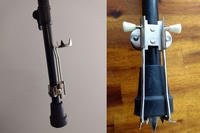No one, including veterans, ever expects to be fired or laid off. This widespread belief leads to a lack of planning when the unexpected happens. Termination is not the best self-esteem builder, but if veterans find themselves on the receiving end of a pink slip, it's time to reevaluate job prospects and dust off those interview skills.
Here are some tips for getting back on your feet after a layoff:
When employers review resumes, they often wonder why applicants are out of work. If no reason is given, they may assume the worst. Were you fired? Could you have quit after a short time on the job, and are you likely to resign just as quickly from your next position?
The hiring manager's mind can wander without a valid explanation. That's why a veteran should mention why they were laid off in the cover letter.
Add a brief explanation in your cover letter's final paragraph, keeping the tone positive. Here are a few phrases veterans can adapt to fit their situation.
- Recent Layoff: As you may have read, (employer name) announced a corporate restructuring initiative. My position was eliminated, so I am available for immediate employment. My primary interest is to learn more about your company's objectives and vision and determine whether my experience and abilities can benefit you in achieving your goals.
- Upcoming Layoff: Although I have enjoyed serving as (job title) for (employer name), the company is undergoing a major organizational restructuring, and my position will be eliminated at the end of this year. If my demonstrated record of (list several key skills, e.g., building talented teams, setting the standard for in-store performance, enhancing operational excellence) meets your needs, I would welcome the chance to speak with you about a possible employment match.
- Layoff Survivor Until Now: Throughout my tenure with (employer name), I earned a reputation for dedication, flexibility and a positive work ethic. In fact, I was retained through four rounds of layoffs in a six-month period. However, (employer name) was forced to complete a major reduction in force last month in an effort to restore profitability, and my position was among those affected. At this point in my career, I am exploring new opportunities that can put my experience, training and goal-oriented approach to best use.
After You're Fired
If a veteran was fired, it's best to avoid mentioning the circumstances of the termination in the cover letter. Even if the veteran feels he was wrongly terminated, trying to explain what happened in a letter will likely raise more questions and probably won't impress the hiring managers. Instead, discuss why you were fired in a face-to-face interview.
Keep the Right Tone
If a veteran writes his cover letters while the sting of the job loss is still fresh, watch out for inadvertent negativity. A cover letter is a marketing tool and should exude a positive attitude to make a solid impression. If the veteran sounds disgruntled, the employer won't want to give him much consideration. Veterans should focus on the key contributions and skills developed in their former position so employers see the value they offer.
These tips originally appeared on Monster.com.
Want to Know More About the Military?
Be sure to get the latest news about the U.S. military, as well as critical info about how to join and all the benefits of service. Subscribe to Military.com and receive customized updates delivered straight to your inbox.











